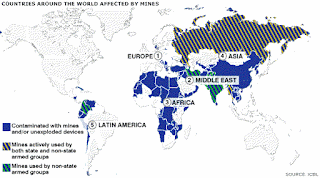Historically,
NGOs have been actively involved in global issue since 1919. The evolution of
International Labor Organization was a combined effort of nongovernmental
organizations, trade unions and business sectors. Participation of NGOs were
crucial in shaping and evolving the UDHR, started a dialogue and discussion in
international forum to create separate and effective institutional mechanism
for children and women under the UN System. In the global governance, the role
of NGOs has been recognized as an important player and valuable non state
actors.
There
are many advantages of NGOs as important driving force to streamline global
governance agenda and to deliver the global public goods. NGOs works as an
informal organizational structure, which enables them to be creative in using information,
attracting wider attention, building capacity of local community at grassroots
level, identifying target intervention and implementation strategy and to
combine all these aspect to build strong network, where information, advocacy
and effective communication creates enabling environment for better governance.
Decentralized and less bureaucratic structure distinguish the civil society
from public and private sectors.
NGOs
have also experienced evolutionary changes and transformed their working style
in last few decades. John Clarks in his book, “World Apart”
illustrates the progression as moving from a focus on ‘poor individuals to poor
communities to poor societies’ to global governance. This is also important
here to understand that each stage of progression of NGOs has been important
part of development process. This has been recognized that NGOs has been
involved in responding to humanitarian needs, building social infrastructure
for local development, engage in advocacy for policy change and to empower the
disadvantage community and civil society. Walter Powell called NGOs as ‘third
mode of economic organization, which is different from market and hierarchal
economic structure’.
The
United Nations recognized that the rise of civil society is one of the
historical events and global governance has not been sole domain of government.
These days, NGOs and non state actors are prime movers as with issues of
gender, climate change, human rights violence, debt related issue, landmines,
HIV/AIDS. The core value of global governance and its global institutions is to
provide good governance, which requires empowered citizenry and accountable
government institutions at national and local level. The Civil Society
organization leverages to improve the relationship between the local
institutions and citizenry.
The
outreach area of NGOs and strong connection with common people help them to
recognize the principled idea, norms to promote those causes to influence and
to advocate the policy change. ‘Make a difference and transnational advocacy
network’ helps the civil society organization to act together and build strong
network at national and transnational level. The transnational advocacy
networks provide an effective platform to NGOs to work together, work jointly
to gather and share information, influence government to change the policy
statement etc. There are many instances, where NGOs has played
significant role in changing behavior for social benefits of society and
influence the policy making process to be more social sensitive.
Civil
Society organizations have used the informational politics to combat female
circumcision, influence several government and administrators like George Bush
to take preventive steps using land mines during war and internal conflict,
Baby Food Campaign against Nestle, while symbolic politics of networks
convinced the global institution, UN to declare Year of Indigenous People,
Watergate issue to create awareness about political corruption, Vietnam War and
used ‘naming and shaming’ campaign against famous director Spielberg
not to make documentary for human right repressive regime of Chinese
Government.
The
leverage politics and accountability politics are another aspect of network,
which brought down the financial institutions such as World Bank to introduce
policy change and influenced Eastern European and Russian government to protect
human rights. Technology, knowledge network, decentralization are major
advantage of third sector and enable the civil society organization to be
accountable and transparent in their working style. NGOs also enjoy
credibility for its technical expertise, grassroots experiences and sound
analysis.There
are many weaknesses inherently presence in the NGOs and its network politics.
NGOs are dependent on the financial resource on the funding agencies. A large
number of funding agencies provide financial resources to NGOs with an
objective to achieve its political agenda.
The
‘rational irrationality’ approach of NGOs is a kind of collective action for
collective goal, which help in building the common strategy of global
governance to address the issue of human security in global policy agenda. NGOs
provides abundance space for ‘policy entrepreneur’, such as Henry Dumont,
Mohammed Yunus, whose idea has positively changed the lives of
millions and idea is being scaled up in other part of the
world.



